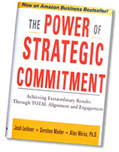
Last week, we took a look at the way agenda-driven meetings may be robbing your company of authentic conversations. In this week’s post, we offer six approaches you should consider in making your meetings more commitment driven.
1. Before planning an agenda, ask yourself the key questions that will allow you to make your meeting meaningful.
- What do we want to accomplish?
- Who should attend the meeting in order to accomplish what we intend?
- What do we want people to leave the meeting with?
- What could we do during the meeting to achieve the desired objectives?
- How much time do we need in order to achieve the objectives?
2. If appropriate, include a cross-section of individuals who will be attending the meeting in the agenda-planning phase. Getting these folks involved from the start will ensure important input up front and gain buy-in for outcomes ahead of time.
3. At the beginning of the meeting, review the intended outcomes and ensure people are there to achieve those objectives. If appropriate — and only if there is flexibility in the schedule and the willingness to do so — ask people whether there are other objectives that would make a difference, and include those if possible.
4. Once the meeting starts, manage toward outcomes, not time allocations. If 30 minutes is allocated to come to agreement for how the team members are going to implement Project X, and the members are agreed in 20 minutes, move on to the next topic. If the conversation is not complete in 30 minutes, but good progress is being made, allocate another few minutes and get closure. Completing the topic will create energy and momentum to address the next item on the agenda.
5. Keep the discussion focused. If the conversation wanders to another topic, and that topic is not part of the intended outcome of the meeting, ask people whether the objective this topic addresses should preempt one of the topics agreed upon at the outset of the meeting. If not, park it. If yes, move forward and pursue the new conversation.
6. At the end of the meeting, review the commitments made — who will do what, and by when? These commitments should be what the minutes of the meeting capture, rather than detailing all the topics discussed.
What breakdowns currently occur in your meetings? We would love to hear your responses to this question or get feedback on this post. Stay tuned for next week, when our invited guest columnist will discuss Making Your Meetings Matter.

